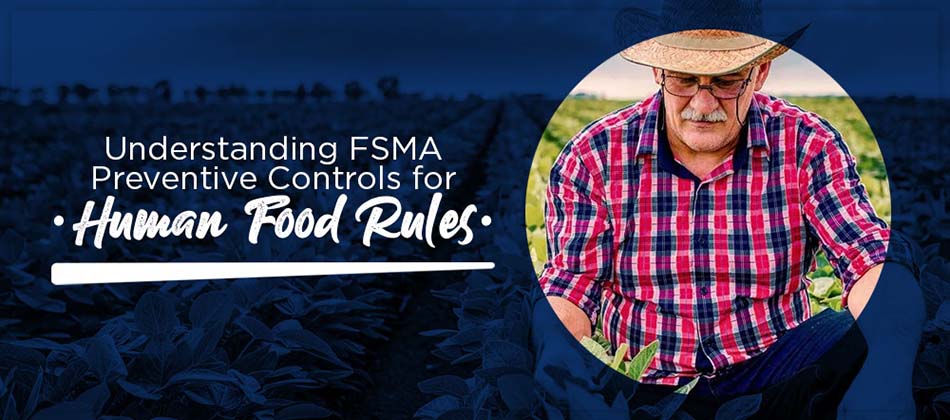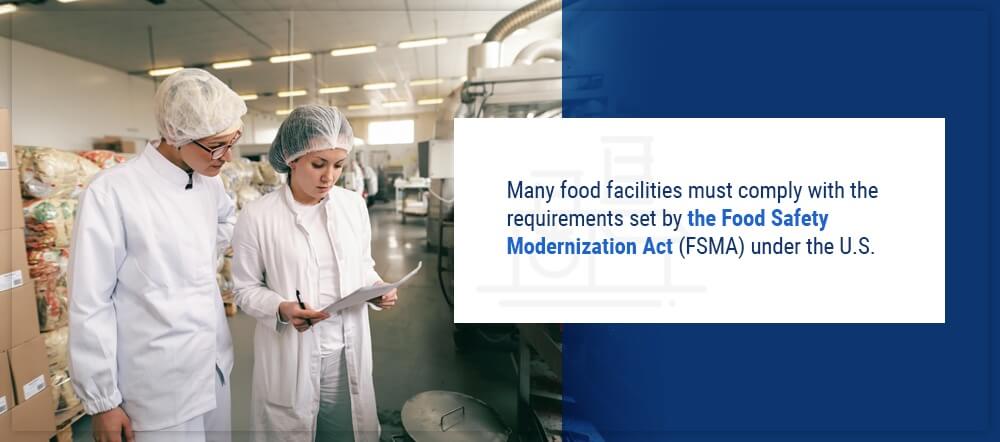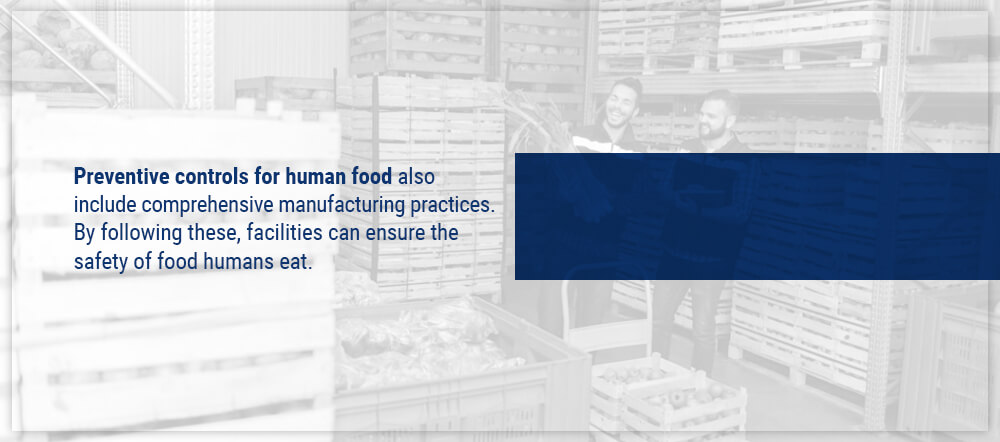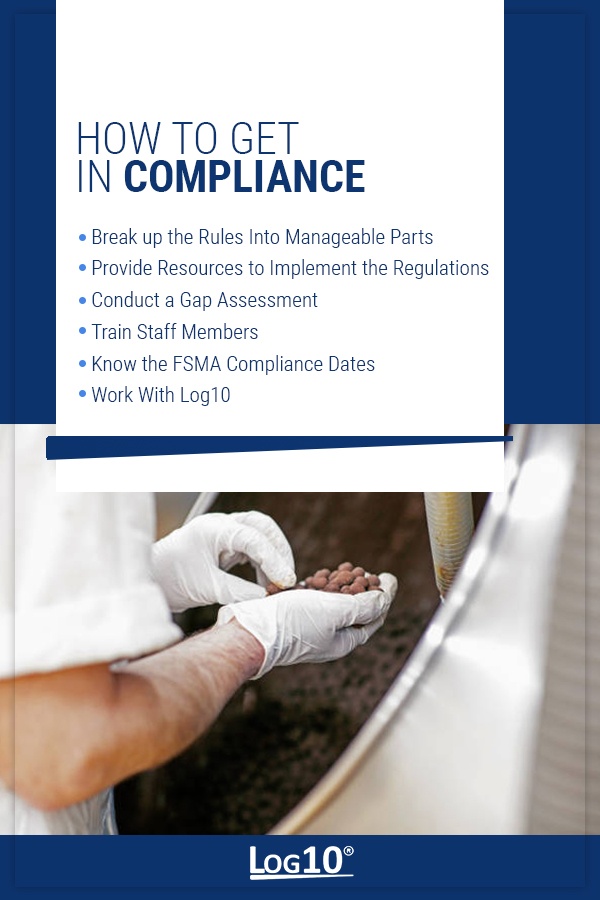
Many consumers are growing increasingly concerned about nutrition. More people are demanding fresh vegetables and fruits and want to know more about how their food gets processed. One such preventive control currently in place is the Food Safety Modernization Act, also known as FSMA.
What are the FSMA requirements for human food? If you are a quality assurance manager or food safety personnel, what do you need to know about preventive controls for human food training and how to be compliant? We have compiled this guide to understanding FSMA preventive controls for human food rules to help you ensure compliance in human food production.
Table of Contents:
- About the Food Safety Modernization Act
- What Are the Preventive Controls for Human Food?
- Who Does It Apply To?
- Exemptions and Modifications
- How to Get in Compliance

About the Food Safety Modernization Act
Many food facilities must comply with the requirements set by the Food Safety Modernization Act (FSMA) under the U.S. Food and Drug Administration, especially if the facility must register with the Food, Drug & Cosmetic Act’s section 415. The FSMA requires food facilities to implement a food safety plan. This plan should include risk-based preventive controls that can identify and minimize hazards, along with a hazard analysis.
About one-sixth of Americans get sick from foodborne diseases every year. This burden is highly preventable, which is why President Obama signed FSMA into law, enabling the FDA to improve food safety in the nation and enhance the protection of public health. The FSMA allows the FDA to focus on prevention, rather than reacting to issues after they have already happened.
The FSMA gives the FDA the ability to enforce higher compliance rates, contain problems and respond better to them when they do occur.
What Are the Preventive Controls for Human Food?
The preventive controls for human food include hazard analysis and risk-based preventive controls, updated manufacturing practices and a revised definition of a “farm.”
Hazard Analysis and Risk-Based Preventive Controls
Every facility must implement a food safety plan focused on preventing and identifying hazards in human food. For hazard identification, you should consider known or reasonably foreseeable physical, biological and chemical hazards.
What should your evaluation of physical, biological or chemical hazards include?
- Consider the severity of injury or illness and the probability thereof in the absence of preventive controls.
- Examine the effect of factors that could impact food, such as processing, formulation, equipment, facility, intended use and ingredients.
- Evaluate environmental pathogens for ready-to-eat foods exposed to the environment.
What risk-based preventive measures should you implement in your facility? The law mandates the following controls to prevent or minimize hazards.
- Process
- Sanitation
- Food allergens
- Supply chain
- Recall plan
If you have critical control points, include these preventive controls at each one. You should also add these controls at other points, as is appropriate for human food safety. The law may not require a preventive measure if another entity controls the hazard later in the distribution process. To be exempt from these preventive controls, you may have to obtain assurances that you intend to control the hazard and disclose that the food will go through further processing.
Components of preventive control management include:
- Monitoring
- Verification
- Corrective actions
Use these components as appropriate so you can ensure the preventive controls are adequate. Consider the controls’ nature and the role they play in the food safety system of your facility.
The verification component should include product testing, validation of preventive controls, environmental monitoring, verification of corrective actions and monitoring, records review and calibration of verification instruments and process monitoring.

Updated Good Manufacturing Practices
Preventive controls for human food also include comprehensive manufacturing practices. By following these, facilities can ensure the safety of food humans eat. These regulations address appropriate matters, such as facility sanitation and personal hygenic practices.
The FDA established Current Good Manufacturing Practices, or CGMPs, in the Code of Federal Regulations in 1969. The FDA began its effort to modernize the CGMP regulations in 2004 and completed the process in September 2015, along with the new requirements for risk-based preventive controls and hazard analysis, all of which were part of the FSMA.
What do good manufacturing practices include today?
- Distribution and holding of human food and its byproducts
- Personnel
- Plant and grounds
- Plant operations
- Plumbing and water supply
- Utensils and equipment
- Sanitation
FSMA human food preventive controls require these updated good manufacturing practices.
Revised Definition of a “Farm”
The rule for preventive controls for human food changes the definition of a farm, specifying the differences between a primary production farm and a secondary activities farm.
A primary production farm refers to a single operation under one management that is located in a single general area, though not necessarily a contiguous area. A primary production farm focuses on raising animals, growing crops, harvesting crops or a combination of these operations.
What other operations can a primary production farm include? Along with the above activities, a primary production farm may also include the following activities:
- Hold or pack raw agricultural commodities, regardless of who raised or grew them
- Hold, pack, process or manufacture processed foods, as long as all the food stays on that farm or a farm that is under the same management and the processing or manufacturing falls within limited categories
A secondary activities farm refers to an operation that is not on a primary farm devoted to packing, harvesting or holding raw agricultural commodities. The law requires ownership or joint ownership of a majority interest of the secondary activities farm by the primary production farm that harvests, grows or raises the majority of the raw agricultural commodities. A secondary activities farm can also process or manufacture the same things as a primary production farm.
Who Does It Apply To?
Who do the FSMA preventive controls for human food rules apply to? The FSMA preventive controls for human food rule applies to facilities that process, manufacture, hold or pack human food.
This rule usually applies to facilities that must register with the FDA under section 415 of the Food, Drug & Cosmetic Act, including both domestic and imported food. Retail food establishments and farms are not subject to the preventive controls for human food.
The Exemptions and Modifications
What are the exemptions and modifications for preventive controls of human food? They include:
- Alcoholic beverages
- Dietary supplements
- Foods that are subject to HACCP
- Foods that are subject to regulations for low-acid canned food
- Qualified facilities
Small businesses are exempt from the full requirements of risk-based preventive controls and hazard analysis, though they are subject to modified ones. These businesses average less than $1 million in sales of human food and the market value of food that is processed, manufactured, packed or held without sales.
Some low-risk processing, manufacturing, holding and packing activities conducted by a small or very small business on farms for specific foods also have some exceptions, such as:
- Making preserves, jellies or jams from acid fruit
- Extracting oils from fruits, vegetables or grains
- Milling grains
Being familiar with these exemptions and modifications is essential for food safety personnel and quality assurance managers.

How to Get in Compliance
How can a company comply with the FSMA? If you are concerned about this, follow these steps.
1. Break up the Rules Into Manageable Parts
When viewed collectively, the FSMA rules can seem intimidating. For many, the amount of documentation by itself can be overwhelming. By reaching out to a food safety consultant, you may be able to break your implementation process into actionable, smaller steps.
2. Provide Resources to Implement the Regulations
You will need financial and technical resources to implement FSMA human food regulations. The required resources to ensure FSMA compliance can be significant. Recordkeeping, training and creating a food safety plan all require resources for implementation.
Though complying with FSMA may have a considerable upfront cost, the costs of non-compliance will be even higher. Recalls can cost companies millions, and the damage to your company’s reputation can present an even larger expense. Reinspection after a food safety problem, for example, can run hundreds of dollars per hour. Test results must come from accredited laboratories.
By providing the resources that are necessary for FSMA compliance, you can give your company the advantages it needs for success.
3. Conduct a Gap Assessment
What is a gap assessment for? A gap assessment measures the readiness of a company for FSMA compliance. This assessment identifies the difference between where a company is in terms of compliance and where they need to be.
By conducting a gap assessment, you can determine what the best strategy and the timeline would be for implementation. This cost-effective method will allow your company to benefit from existing systems and make effective decisions about how to allocate resources.
4. Train Staff Members
To successfully implement food safety and meet FSMA compliance, you will need to train your staff members. If you don’t have a Hazard Analysis and Critical Control Points plan in place, you should begin by training your staff.
A successful, comprehensive training initiative should span your organization and include your top-level management. The FSMA also requires your company to have your Preventive Controls Qualified Individual attend an FSPCA-designed training course known as the Preventive Controls for Human Food Training Course. This training can also be on-site for your company to educate a group of your staff.
5. Know the FSMA Compliance Dates
What compliance dates for businesses should you know for your company? The dates vary by the type of business.
- Small business: Two years
- Very small business: Three years
- Any other business: One year
These compliance dates do not apply to all businesses. For example, compliance dates are different for the supply-chain program.
6. Work With Log10
Log10 can help your company ensure it is in compliance. At Log10, we can provide your company with expert professional consulting, testing, research and training. We want to help you ensure that that your food products are safe and high quality.
We aim to offer comprehensive services that support the food industry in quality and microbiological safety. We focus on microorganisms that can cause food spoilage or human illness, and strive to replace them with good bacteria that can prevent or eliminate them. Among our services, we also provide food industry companies with custom probiotics to enhance consumers’ digestive health and protect consumers from foodborne pathogens.
If you have any foodborne pathogens, we can offer a solution through on-site training. We will test the food and fix what is wrong with the food products. Our probiotics separate us from our competitors, as we understand the importance of using probiotics to fight off bad bacteria.
We service both national and international clients from our headquarters in Oklahoma. Our product is tangible, dispensable and edible. Additionally, we can train staff members to dispense this product themselves and offer personable training to your employees. Our presentations and hands-on training will ensure that your company can carry on with compliance on your own after we leave. While, of course, we want to help your staff while we are with you, we also want to ensure your company’s success in the future.
Safety of human food is something that should be a concern for your company at all times — not just when inspectors from the FDA are in your facility. Your company’s commitment to food safety should be ongoing, and as such, you may want to establish a team dedicated to food safety that meets often to keep your company in compliance with FSMA.
Contact Log10 With Your Questions
As food safety personnel or a quality assurance manager, you know how vital it is to comply with food safety requirements in human food production. At Log10, we offer a wide range of food product testing, training, research, remediation and consulting services. We can help you create a comprehensive food safety plan to ensure you have the proper preventive measures in place.
Because our team has several years of experience in food safety, we can develop control and prevention strategies that meet your specific needs. We can help your company establish the best practices in food safety. Contact us at Log10 with your questions.

